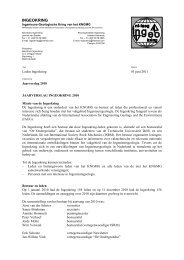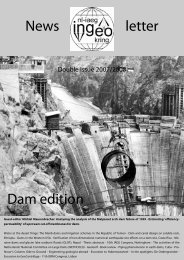environment
environment
environment
- No tags were found...
You also want an ePaper? Increase the reach of your titles
YUMPU automatically turns print PDFs into web optimized ePapers that Google loves.
Ingeokring Newsletter<br />
programs cannot easily achieve professional<br />
engineering registrations – although they often become<br />
members of multi-disciplinary teams undertaking a<br />
variety of construction projects and <strong>environment</strong>al<br />
evaluations.<br />
The engineering geologist and the civil engineer<br />
together share the responsibility for ensuring the public<br />
health, safety, and welfare associated with geologic<br />
factors that may affect or influence engineering works.<br />
Yet, in most cases, the public demands that the<br />
professional engineers be held responsible for the safety<br />
and integrity of their works. Thus the engineering<br />
geologist may be considered as a specialist advisor to<br />
the design team, and may hold a position similar to an<br />
architect or other design specialist. In this role, the<br />
engineering geologist often cannot provide legally<br />
binding approvals of a design of an engineering work –<br />
many laws require a Professional Engineer make such<br />
judgments. There is a growing requirement for<br />
establishing a separate professional registration of<br />
geologists, especially for those individuals undertaking<br />
engineering geology investigations.<br />
Professional Liability and Professional Registration<br />
Professional liability has become an important concern<br />
for many professions in many countries and geological<br />
engineers and engineering geologists are not immune<br />
from this condition. These concerns have led to<br />
increased professional registration requirements for<br />
both geologists and engineers. Several competing<br />
registration approaches have developed in the USA,<br />
Canada, and Europe. In North America, the professional<br />
registration of engineers has been legislated at the state/<br />
provincial level since the early 20 th century and has been<br />
accepted as needed to protect the public interests. The<br />
case for an equivalent registration of geologists has<br />
not been so clearly accepted, and in fact there has been<br />
considerable opposition to such registration by many<br />
geologists.<br />
In the USA, procedures to register engineers and<br />
geologists are administered quite independently by<br />
distinct official boards of registration. While all states<br />
have engineering boards, only about one-half the states<br />
have geology boards. In Canada, the provincial<br />
legislatures delegate the registration process to<br />
professional associations, and in the majority of the<br />
provinces a single association supervises the<br />
registration of engineers and geologists. The concept<br />
of professional registration is evolving in Europe. Once<br />
again, geologists are tending to lag behind engineers in<br />
embracing the need for professional registration.<br />
International trends, especially the increased<br />
globalization of markets for consultation services as<br />
well as goods, have placed new pressures on the existing<br />
professional registration procedures. The requirements<br />
to have multiple registrations in several states or<br />
provinces in North America, in order to undertake<br />
projects at several locations, impose time and cost<br />
constraints on individual engineers and geologists, and<br />
their employers. Only limited reciprocity arrangements<br />
currently exist between Canada and the United States.<br />
Similar trends within the European Union have led to<br />
new developments that promote European<br />
designations.<br />
The concept of professional registration for geologists<br />
is still relatively young. Major constraints are the lack<br />
of public acceptance of the need for registration, the<br />
lack of “official” legal standing within some jurisdictions,<br />
the objections of many geologists who see registration<br />
as restricting their mobility and freedom to conduct<br />
studies, objections by other professions, and<br />
competition among professional societies for authority<br />
to provide and supervise such registrations.<br />
What Will the Future Bring?<br />
Engineering Geology and Geological Engineering<br />
appear to be at a crossroads – their ability to provide<br />
the expertise to solve society’s needs and desires for a<br />
more livable <strong>environment</strong> points toward a bright future.<br />
Certainly, new and ever more challenging <strong>environment</strong>al<br />
issues will make the design and construction of new<br />
transportation and other facilities depend even more<br />
on an accurate prediction of geologic conditions. The<br />
increasingly sophisticated designs depend for their<br />
success on the involvement and acceptance of the<br />
geological engineer and engineering geologist.<br />
Yet Geological Engineering does not have the advocacy<br />
within the larger established professional societies to<br />
ensure its growth or even survival as a designated<br />
independent engineering specialization. Even the wider<br />
field of engineering geology practice, encompassing<br />
both geological engineers and engineering geologists,<br />
is facing a similar identity crisis. This is occurring in<br />
spite of expanding employment opportunities and the<br />
recognition of the need for such specialists by potential<br />
employers.<br />
The limited, and shrinking, capacity to educate and train<br />
new practitioners in these fields provides an even greater<br />
threat. The majority of the academic programs are<br />
relatively small. In many countries, universities face<br />
economic pressures that encourage the elimination of<br />
smaller “specialist” or “elitist” high-cost programs and<br />
departments. Throughout Western Europe and North<br />
America, the enrollment of students in engineering and<br />
science, especially geoscience, has been falling for<br />
several years. Many talented students are not selecting<br />
the “tougher” courses of study demanded by<br />
engineering and science fields. Topical areas perceived<br />
as narrow specialties are apparently at a further<br />
50




